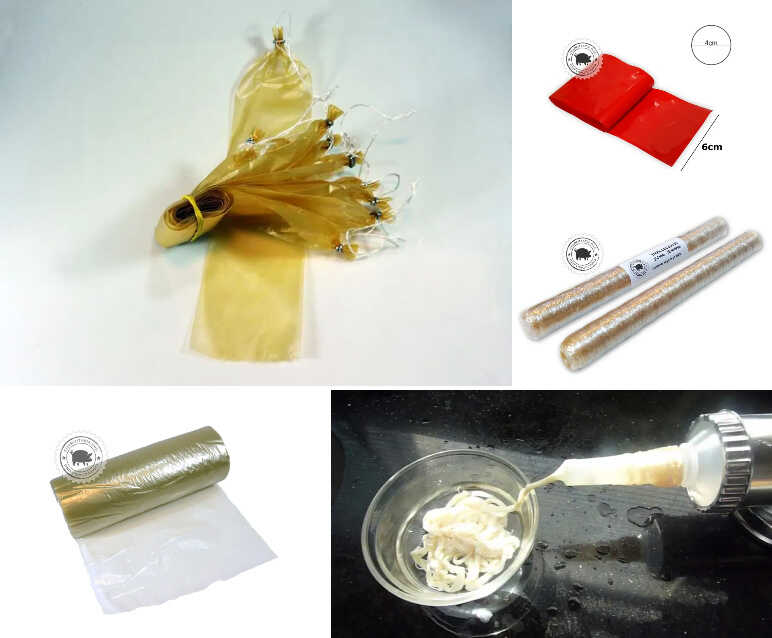
As tripas naturais são feitas a partir de intestinos de animais, geralmente de porco, ovelha ou boi. Elas são cuidadosamente limpas e processadas para remover qualquer resíduo e para garantir que sejam seguras para uso alimentar. As tripas naturais são mais frágeis do que as artificiais e tendem a ser mais difíceis de manusear durante o processo de enchimento.
Já as tripas artificiais são feitas de materiais sintéticos, como celulose, colágeno ou plástico. Elas são mais resistentes do que as tripas naturais e podem ser mais fáceis de manusear durante o processo de enchimento. As tripas artificiais também têm a vantagem de serem uniformes em tamanho e formato, o que pode tornar o processo de produção de linguiças mais eficiente.
Ambos os tipos de tripas têm vantagens e desvantagens, e a escolha dependerá das necessidades do produtor. As tripas naturais são frequentemente preferidas pelos fabricantes de linguiças artesanais que buscam uma experiência mais tradicional e autêntica, enquanto as tripas artificiais são mais comuns em grandes produções comerciais devido à sua uniformidade e facilidade de uso.





Vantagens das tripas naturais
Sabor autêntico: As tripas naturais possuem uma textura e sabor únicos que ajudam a realçar o sabor da carne e dos temperos usados na linguiça. Isso pode resultar em um produto final mais saboroso e autêntico.
Permeabilidade ao ar: As tripas naturais permitem que o ar circule em torno da linguiça durante o processo de cura, o que ajuda a melhorar o sabor e a textura do produto final.
Tradição: O uso de tripas naturais é uma prática antiga na produção de linguiças, que remonta há séculos. Usá-las para fazer linguiças pode ajudar a manter a tradição e preservar a cultura de produção de alimentos.
Eco-friendly: O uso de tripas naturais para fazer linguiças pode ser mais eco-friendly do que o uso de tripas artificiais, já que elas são biodegradáveis e compostáveis.
Variedade: As tripas naturais estão disponíveis em uma variedade de tamanhos e formatos, o que pode permitir que o produtor crie uma ampla variedade de linguiças com diferentes formas e tamanhos.
-
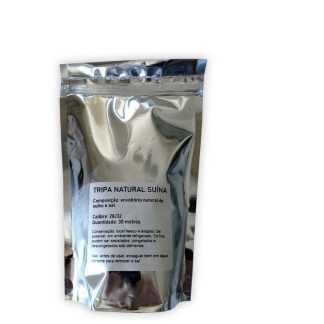 Tripa suína natural para linguiçaR$ 52,00
Tripa suína natural para linguiçaR$ 52,00
Desvantagens das tripas naturais
Fragilidade: As tripas naturais são mais finas e frágeis do que as tripas de colágeno ou as tripas plásticas, o que pode resultar em ruptura, furos ou vazamentos durante o processo de produção ou cozimento.
Irregulres: A variação natural do diâmetro dificulta a avaliação prévia do peso dos produtos para os produtores. Algumas pessoas podem achar que os produtos cárneos embalados em tripas naturais têm uma aparência menos uniforme do que aqueles embalados em tripas de colágeno ou plásticas.
Preparação: As tripas naturais requerem uma preparação cuidadosa antes de serem utilizadas na produção de produtos cárneos. Isso inclui a remoção de gorduras e outros tecidos que possam afetar a qualidade da tripa e do produto final.
Higiene: As tripas naturais exigem cuidados adicionais em termos de higiene e limpeza, pois podem conter bactérias e outros microrganismos que podem afetar a qualidade do produto final.
Vantagens das tripas de colágeno
Uniformidade: As tripas de colágeno são feitas em um processo industrial controlado, o que significa que elas têm uma espessura uniforme e são mais resistentes do que as tripas naturais. Isso pode ajudar a garantir a consistência do produto final e a tornar o processo de produção mais eficiente.
Higiene: As tripas de colágeno são feitas a partir de materiais higiênicos e são esterilizadas durante o processo de produção, o que pode ajudar a reduzir o risco de contaminação bacteriana.
Fácil manuseio: As tripas de colágeno são mais fáceis de manusear do que as tripas naturais, já que são menos frágeis e mais resistentes. Isso pode tornar o processo de enchimento mais rápido e eficiente.
Conservação: As tripas de colágeno são embaladas individualmente e seladas a vácuo, o que ajuda a prolongar a sua vida útil e a reduzir o desperdício.
Sem sabor: As tripas de colágeno são inodoras e sem sabor, o que significa que elas não afetam o sabor da linguiça.
Apropriadas para dietas restritivas: As tripas de colágeno são livres de gordura e carboidratos, tornando-se uma opção adequada para pessoas com restrições alimentares.
Desvantagens das tripas de colágeno
Embora as tripas de colágeno sejam amplamente utilizadas na produção de produtos cárneos, elas também apresentam algumas desvantagens, tais como:
Limitações de tamanho: As tripas de colágeno têm limitações em termos de tamanho e diâmetro, o que pode restringir a produção de certos tipos de produtos cárneos.
Pouca elasticidade: As tripas de colágeno são menos elásticas, expandem menos do que as tripas naturais, o que pode resultar em rupturas ou vazamentos durante o processo de produção ou cocção.
Sensibilidade à temperatura: As tripas de colágeno são mais sensíveis à temperatura do que as tripas naturais, o que pode tornar mais difícil o processo de produção de produtos cárneos.
Aparência: As tripas de colágeno podem afetar a aparência dos produtos cárneos. Algumas pessoas podem achar que os produtos cárneos embalados em tripas de colágeno têm uma aparência menos natural do que aqueles embalados em tripas naturais.
Preço: As tripas de colágeno podem ser mais caras do que as tripas naturais, o que pode aumentar o custo de produção dos produtos cárneos.
Vantagens das tripas plásticas
Salsichas: As tripas plásticas são frequentemente usadas para fazer salsichas, já que são mais resistentes do que as tripas naturais e permitem uma maior uniformidade e controle de qualidade na produção em larga escala.
Produtos fatiados: As tripas plásticas também são usadas para embalar produtos cárneos fatiados, como presunto, peito de peru, entre outros. Isso porque elas ajudam a proteger o produto da oxidação e prolongam sua vida útil.
Produtos defumados: As tripas plásticas são ideais para a produção de produtos cárneos defumados, como linguiças, já que são capazes de resistir às temperaturas elevadas do processo de defumação.
Produtos congelados: As tripas plásticas são frequentemente usadas para embalar produtos cárneos congelados, já que ajudam a proteger o produto do congelamento e da desidratação.
-
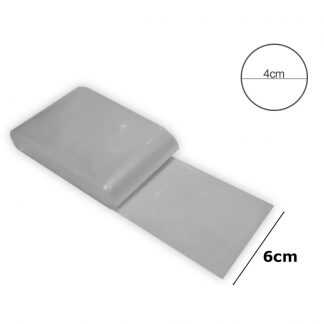 Tripa plástica poliamida 6 transparenteR$ 12,00
Tripa plástica poliamida 6 transparenteR$ 12,00 -
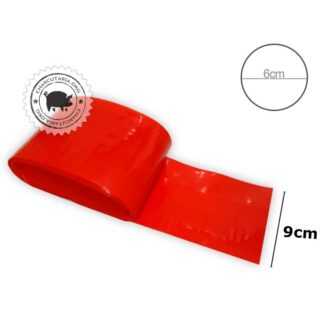 Tripa plástica poliamida 9 vermelhaR$ 19,00
Tripa plástica poliamida 9 vermelhaR$ 19,00 -
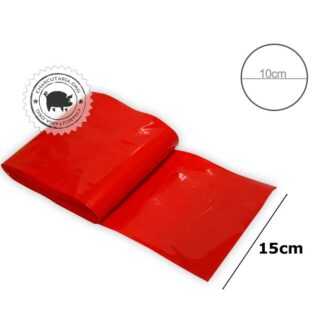 Tripa plástica poliamida 15 vermelhaR$ 25,00
Tripa plástica poliamida 15 vermelhaR$ 25,00
Desvantagens das tripas plásticas
O uso de tripas plásticas em produtos cárneos também apresenta algumas desvantagens, tais como:
Perda de sabor: As tripas plásticas podem afetar o sabor dos produtos cárneos, pois impedem a liberação de vapores e gases. Isso pode levar a uma perda de sabor ou aroma durante o processo de cozimento.
Aparência: A utilização de tripas plásticas pode afetar a aparência dos produtos cárneos. As tripas plásticas tendem a ser mais brilhantes e menos naturais do que as tripas de colágeno ou naturais.
Aderência: A aderência das tripas plásticas à carne pode ser um problema, especialmente quando se trata de produtos cárneos que contêm um alto teor de gordura. Isso pode resultar em produtos cárneos com uma aparência desagradável e com baixa qualidade visual.
Impacto ambiental: As tripas plásticas são geralmente feitas de materiais não biodegradáveis, o que pode ter um impacto negativo no meio ambiente. Além disso, o descarte inadequado de tripas plásticas pode levar à poluição do meio ambiente.
Restrições regulatórias: Em alguns países, as tripas plásticas são proibidas para uso em produtos cárneos, devido a preocupações com a segurança alimentar e a saúde do consumidor.
Vantagens das tripas de celulose
Linguiças defumadas: As tripas de celulose são boas para linguiças defumadas, pois são capazes de resistir às altas temperaturas do processo de defumação. Além disso, as tripas de celulose são permeáveis ao ar e permitem que a fumaça penetre na linguiça, o que contribui para o sabor e o aroma defumado característicos.
Salsichas e linguiças cozidas: As tripas de celulose também são utilizadas para salsichas e outras linguiças cozidas, pois são capazes de resistir às altas temperaturas do processo de cozimento e manter a forma e o volume da linguiça.
Embutidos curados: As tripas de celulose são usadas também para embutidos curados, como salame, porque ajudam a manter a forma e a prevenir a perda de umidade durante o processo de maturação. Além disso, as tripas de celulose são permeáveis ao ar e permitem que os microorganismos benéficos de culturas starter se desenvolvam no interior do embutido, contribuindo para o sabor e o aroma característicos.
Produtos vegetarianos: As tripas de celulose são uma opção adequada para produtos vegetarianos, pois não contêm ingredientes de origem animal.
-
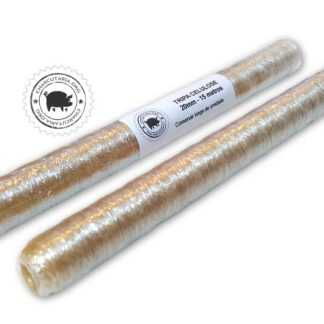 Tripa de celulose 20mmR$ 18,00
Tripa de celulose 20mmR$ 18,00
Desvantagens das tripas de celulose
Embora as tripas de celulose sejam uma opção popular para certos tipos de produtos cárneos, elas também apresentam algumas desvantagens, tais como:
Custo: As tripas de celulose são mais caras do que as tripas naturais ou as tripas de colágeno, o que pode aumentar o custo de produção dos produtos cárneos.
Processo de fabricação: A fabricação das tripas de celulose é um processo complexo que envolve a mistura de celulose, água e outros aditivos químicos. Isso pode tornar a produção de tripas de celulose mais difícil e complicada do que a produção de outros tipos de tripas.
Rejeição pelo consumidor: Alguns consumidores podem preferir produtos cárneos embalados em tripas naturais ou de colágeno, em vez de tripas de celulose, devido à sua aparência e textura.
Limitações de tamanho: As tripas de celulose geralmente têm um tamanho limitado, o que pode restringir a produção de alguns tipos de produtos cárneos.
Não biodegradáveis: As tripas de celulose não são biodegradáveis, o que pode ser um problema do ponto de vista ambiental, especialmente se não forem descartadas corretamente.
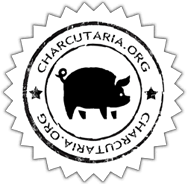
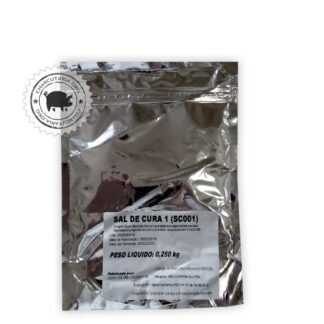
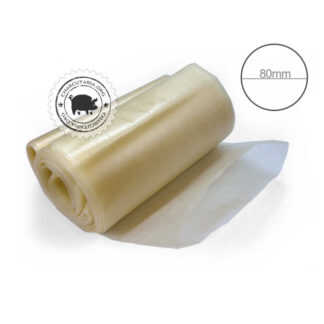
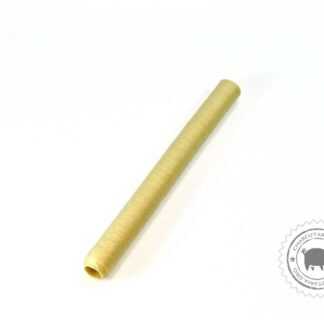
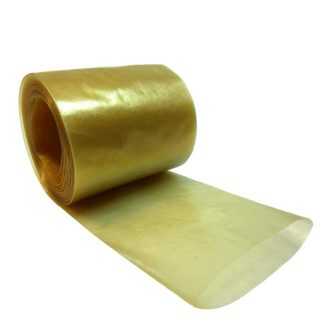
Estou usando tripa de colágeno para embutir salsichas. O grande problema é que fica com muitas bolhas de ar no momento de embutir. Acredito que eu esteja fazendo algo errado. Preciso de esclarecimentos. É possível? Obrigada.
É preciso compactar bem a massa na ensacadeira de linguiças, geralmente o ar entra na hora de embutir, tem que conseguir compactar bem a massa de usar uma ensacadeira que não coloque ar junto. Moedores que também ensacam geralmente fazem isso. Pode adquirir uma ensacadeira e compactar bem a massa no tubo, assim evita o ar.
Queria saber com diminuir a aderencia de um produto a tripa de colageno.
Tudo bom Eduardo ? Eu creio que sim 👍? Rapaz estava lendo a respeito das tripas e gostaria de saber mais porque vc tem experiência no ramo da charcutaria, sobre linguiças vegana qual tripa usar e se devo usar nas receitas sal de cura 1 e emulsificante, para armazenamento em longo prazo para vendas. Aguardo seu retorno obrigado 🙏🏾.
Oi Wagner. Melhor não usar o sal de cura pois o nitrito interage com a carne, não com os vegetais, portanto não haverá conversão do nitrito e acabará consumindo tudo desnecessariamente. Emulsificante e antioxidante pode usar. As tripas que pode usar são as de celulose e plásticas(poliamidas).